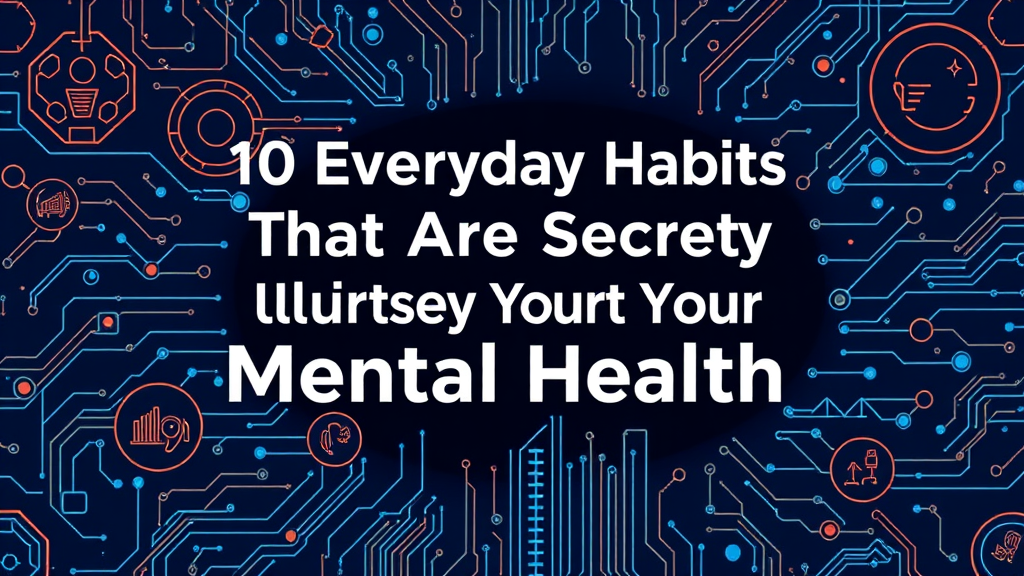
Mental health is just as important as physical health, yet many of us unknowingly engage in behaviors that can gradually take a toll on our emotional well-being. While some habits seem harmless or even productive, they may be slowly undermining your mental state. If you’ve been feeling more stressed, anxious, or down lately, it might be time to take a closer look at your daily routine. In this article, we’ll explore 10 everyday habits that affect mental health negatively and what you can do to protect your peace of mind.
1. Skipping Sleep for ‘Productivity’
We live in a hustle culture where sacrificing sleep is often seen as a badge of honor. But in reality, missing out on adequate rest can be one of the most damaging habits that affect mental health negatively.
Why It Matters
Sleep is essential for brain function. During sleep, your brain processes emotions, consolidates memories, and recharges for the day ahead. Chronic sleep deprivation has been linked to increased risks of anxiety, depression, and irritability.
What You Can Do
- Aim for 7-9 hours of quality sleep each night
- Create a calming bedtime routine without screens
- Keep a consistent sleep schedule, even on weekends
2. Constant Social Media Scrolling
While social media helps us stay connected, overuse can be one of the more modern habits that affect mental health negatively without us realizing it.
Why It Matters
Endless scrolling can lead to comparison, low self-esteem, and a distorted view of reality. The constant flood of information can also increase stress and reduce your attention span.
What You Can Do
- Limit social media time to 30-60 minutes per day
- Unfollow accounts that make you feel inadequate
- Schedule regular digital detox days
3. Neglecting Physical Activity
Sitting all day might seem like a minor concern, but lack of movement is a silent contributor to declining mental well-being.
Why It Matters
Exercise releases endorphins, which are natural mood boosters. Sedentary lifestyles are associated with a higher risk of depression and anxiety.
What You Can Do
- Incorporate at least 30 minutes of exercise into your daily routine
- Try activities you enjoy like dancing, walking, or yoga
- Take movement breaks during long sitting periods
4. Bottling Up Emotions
Many people are taught to ‘stay strong’ and avoid expressing difficult emotions. Unfortunately, this can backfire over time.
Why It Matters
Suppressing emotions can lead to increased stress, anxiety, and even physical health issues. Emotional suppression can also damage relationships.
What You Can Do
- Practice journaling to process your emotions
- Talk to trusted friends or family members
- Consider seeing a therapist if you’re struggling to cope
5. Overcommitting and People-Pleasing
Saying yes to everything might help you feel helpful or accepted, but this habit could be slowly eroding your mental health.
Follow our social media to get an daily update!
Why It Matters
Taking on too much leads to overwhelm and burnout. When you prioritize others over your own well-being, resentment and emotional exhaustion can build up.
What You Can Do
- Set boundaries and respect your limits
- Learn to say no without guilt
- Schedule downtime for self-care
6. Ignoring Diet and Hydration
You are what you eat — or at least, how you feel can be deeply influenced by nutrition.
Why It Matters
Poor dietary habits like excessive sugar, caffeine, or skipping meals can lead to mood swings, fatigue, and lack of focus. Dehydration can also make you feel tired and irritable.
What You Can Do
- Eat balanced meals with whole foods and nutrients
- Drink at least 8 glasses of water daily
- Limit highly processed and sugary foods
7. Negative Self-Talk
Your inner voice can either be your biggest cheerleader or your greatest critic. When it leans negative, it becomes one of the sneakiest habits that affect mental health negatively.
Why It Matters
Persistent self-criticism can lower self-esteem and contribute to anxiety and depression. It creates a loop of self-doubt and fear of failure.
What You Can Do
- Practice self-compassion and positive affirmations
- Challenge negative thoughts with evidence
- Surround yourself with supportive people
8. Procrastination
Putting things off may offer temporary relief but often leads to more stress and guilt, especially when deadlines loom.
Why It Matters
Procrastination can make you feel overwhelmed and unproductive. Over time, it hurts confidence and increases anxiety.
What You Can Do
- Break tasks into smaller, manageable steps
- Use tools like to-do lists and timers
- Reward progress instead of waiting for perfection
9. Avoiding Nature
In a tech-driven world, many people spend their entire day indoors, missing the mental health benefits that come from being in nature.
Why It Matters
Studies show that time spent in natural environments can reduce stress, boost mood, and improve focus. Lack of sunlight exposure can also affect vitamin D levels, which play a role in mental health.
What You Can Do
- Take short walks outside during the day
- Plan a weekly visit to a park or green space
- Bring nature indoors with plants or natural décor
10. Living Without Purpose
Going through the motions without a sense of meaning can leave you feeling disengaged and unfulfilled.
Why It Matters
Having goals, passions, or a deeper sense of purpose fuels motivation and provides a buffer against mental health challenges.
What You Can Do
- Identify what truly matters to you
- Volunteer or take up a meaningful hobby
- Set personal goals that align with your values
Conclusion
It’s easy to overlook everyday behaviors that quietly chip away at your mental resilience. But by becoming aware of these common yet harmful habits that affect mental health negatively, you’re already taking the first step toward improvement. Remember, small changes can lead to big results. Start with one or two adjustments and gradually build from there. Your mind deserves as much care and attention as your body — treat it kindly every day.
If you’re experiencing chronic symptoms of anxiety, depression, or emotional distress, it’s always best to consult a qualified mental health professional.



